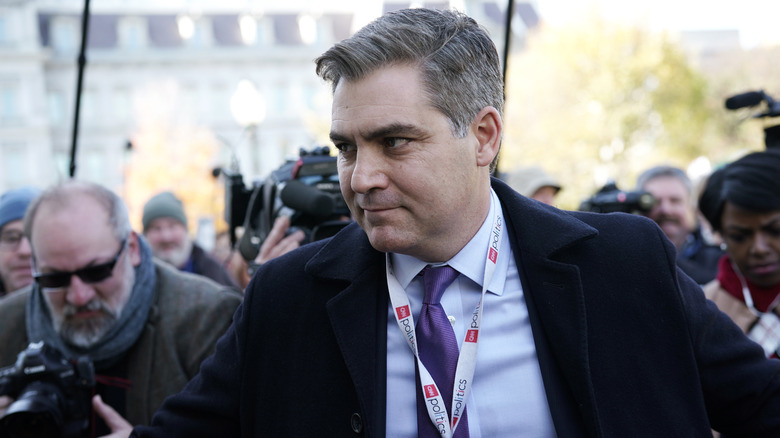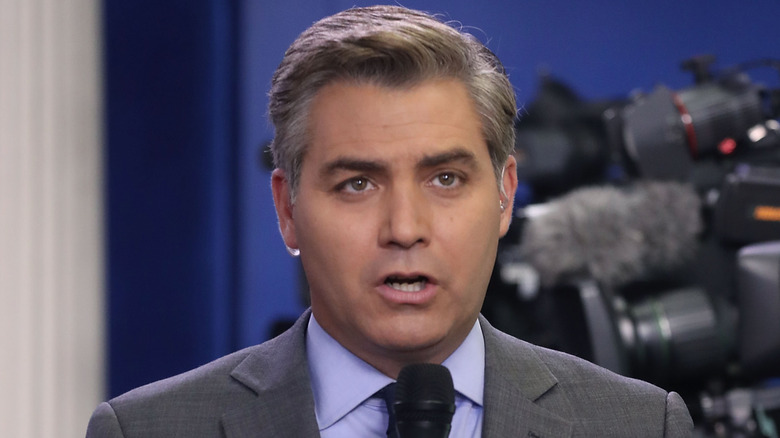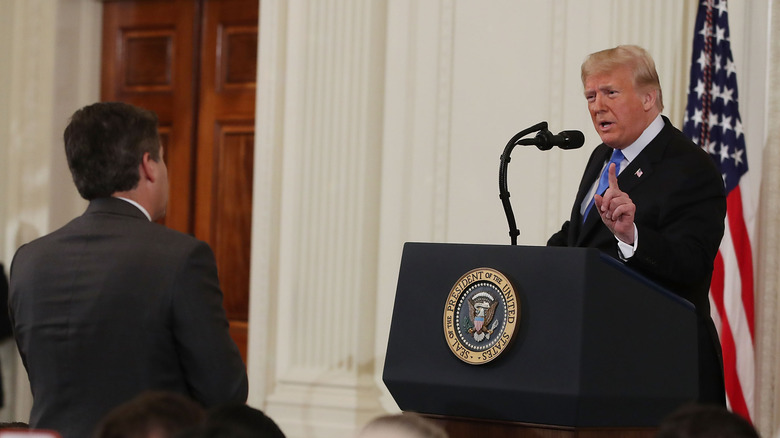Inside CNN's Jim Acosta's Brutal Feud With The Trump White House
Donald Trump is known for his attacks on the media. But his administration's aggression toward CNN, especially seasoned journalist Jim Acosta, has likely been the worst. During his first term, Acosta became a focal point in the Trump White House's fraught relationship with the press. Known for his hard-hitting questions, he frequently found himself at odds with then-president Trump. The tension between Acosta and the Trump administration encapsulated the broader struggle between the media and the presidency, particularly during a time when the term "fake news" became a central talking point in American discourse.
From the very start of Trump's transformation to president, CNN and Acosta were frequent targets of criticism. The politician often referred to CNN as "fake news," calling the network's credibility into question during press conferences and on social media. Acosta's aggressive questioning often drew ire, leading to verbal sparring matches that captured national attention. "We are not the enemy of the people," Acosta tweeted in 2018, responding to Trump's repeated use of the phrase to describe the press. "You are not my enemy."
The feud reached a boiling point as Acosta became a symbol of resistance within the White House press corps. His persistence and direct (some say combative) approach highlighted the administration's contentious relationship with the media. But for Acosta, the repercussions extended far beyond the heated exchanges at press briefings, impacting both his professional and personal life in unexpected ways.
Death threats and dangerous fallout
Jim Acosta's role as CNN's chief White House correspondent came with heavy consequences, including an influx of threats to his safety. As he stood firm in questioning the Trump's administration's policies and rhetoric, he became a target for those who viewed his reporting as antagonistic. "Now I receive death threats regularly, aimed at my work covering the president," Acosta, whose real name is Abilio, said in a 2018 statement, reflecting on the dangers he faced as a journalist under constant scrutiny (via The Hollywood Reporter). The perils extended beyond Acosta himself, occasionally implicating his family. "This has frightened both me and my family and required us to take additional security measures in our daily lives," he said.
The climate of hostility toward the media, exacerbated by the Trump administration's rhetoric and some major media failures at the time, made covering the White House a high-stakes endeavor. Acosta and his network took the threats seriously, implementing additional security measures to ensure his safety. "We are all on the same team. We are all Americans," Acosta tweeted in response to the attacks. These threats served as a stark reminder of the risks journalists face in their line of work, and Acosta's experiences became emblematic of the broader struggles faced by reporters during the Trump presidency.
Losing the press pass
The culmination of the feud between Jim Acosta and the Trump administration came in November 2018, when Acosta was denied access to the White House. "I've just been denied entrance to the WH," he tweeted at the time. "Secret Service just informed me I cannot enter the WH grounds for my 8pm hit."
The revocation of Acosta's press pass followed a heated exchange with Donald Trump during a press conference, where the reporter pushed the president on his immigration policies. The White House justified its actions by accusing Acosta of inappropriate behavior during the event, a claim many disputed by pointing to the video evidence. The move sparked outrage among journalists and media organizations, who viewed the revocation as a direct attack on press freedom.
CNN quickly filed a lawsuit against the Trump administration, claiming the action violated Acosta's First and Fifth Amendment rights. The legal battle ended with a federal judge ruling in favor of Acosta, temporarily restoring his press pass. The incident set a significant precedent for press freedoms, with media outlets rallying behind Acosta and CNN in defense of journalists' rights. "I want to thank all of my colleagues in the press who supported us this week," Acosta remarked after the ruling (via NPR). "Let's get back to work." His experiences during the Trump presidency underscored the personal and professional challenges faced by journalists in an increasingly polarized political climate and revealed what Acosta thinks about the future of journalism.


